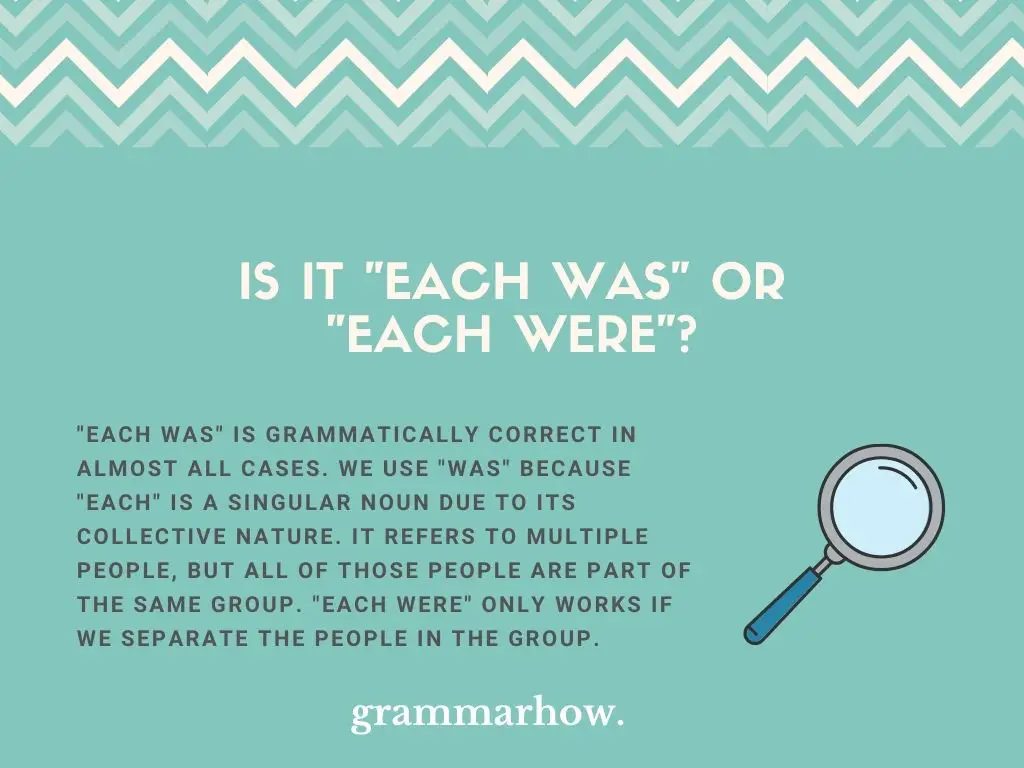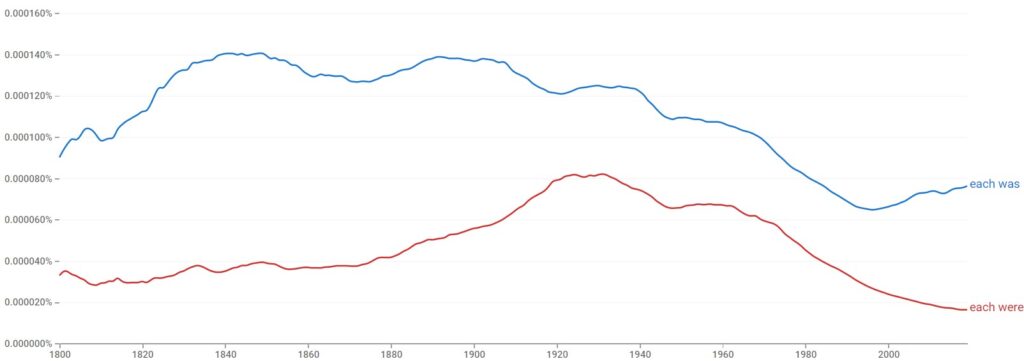“Each” can be a tricky noun to get your head around. It’s a collective one, meaning it’s a singular form, but it typically refers to multiple people (which many of us confuse as the plural form). This article will explain how “each was” and “each were” works.
Is It “Each Was” Or “Each Were”?
“Each was” is grammatically correct in almost all cases. We use “was” because “each” is a singular noun due to its collective nature. It refers to multiple people, but all of those people are part of the same group. “Each were” only works if we separate the people in the group.

Typically, we don’t use “each was” together. Instead, we would show how the group is created by using phrases like “each of us was” or “each student was.”
On the flip side, “each were” is more commonly seen together. It’s likely that we’ll split up “each” by including a pronoun before it.
For example, “we each were” is correct because “we” allows us to treat the people within the collective group of “each” as individuals. This is how it works in most cases when using “each” (regardless of the verb choice).
When Should I Use “Each Was”?
“Each was” is more appropriate when we’re referring to a group of people as “each.” We can specify the group of people with “of” phrases or by using an exact name (i.e. “each person was”).
The name of the group is always written in the singular form. This is due to “each” being a singular entity in itself. It’s a collective noun, so we use it as one entity (even when it refers to many people or things).
- Each of them was going to go and have fun out there. We wanted to see what we could do.
- Each of us was here for a while. We’re not best pleased with how we were treated, though.
- Each one was having a difficult time with what was happening. That’s why they came to me for some guidance.
- Each person was in here for a different reason. It’s always interesting to hear what might have made them crack.
- I think each of them was trying to get ahead of the other. That’s what created such a hostile working environment.
- Each worker was going to be announcing their retirement in their own fashion. It was good fun to watch.
- Each person was sure they were right. It made it very difficult to convince some people they were wrong.
When Should I Use “Each Were”?
“Each were” is a bit more specific in how it’s used. We only use it when we are splitting up the “each” group of people. If we include a pronoun beforehand, we can split the group up.
Alternatively, we might use “each were” when expressing possibilities of things happening. Using words like “if” or “I wish” before “each were” is a great way to show how we wish something were possible.
- We each were unsure about what we needed to do. That’s why we asked our teacher for help whenever we could.
- If they each were going to make it in this world, they needed to change their opinions about one another.
- We each were hoping you’d be able to answer a few questions. We’re eager to find out what you think.
- If each of them were going to apply for this job, I don’t know how I’d make the decision in time.
- I wish they each were given an opportunity here. It would be so much more fun to see that happen.
- I think you each were having a tough time with it. I understand that, but we can’t have that happen again, I’m afraid.
- They each were wanting something more. I had to find a way to get that done for them.
Is “Each Was” Or “Each Were” Used The Most?
It’s time to look over some statistics to see which of the two phrases is more common. It’s clear they are both correct, but there always tends to be one clearer winner.
According to Google Ngram Viewer, “each was” is used the most. This is because “each” is most commonly written as a collective noun to refer to multiple people at the same time. We use “was” whenever we’re writing in the singular form.

Of course, “each were” is still grammatically correct. We can see this because it’s used on the graph (and it’s not all that uncommon in comparison with “each was”). Still, it’s definitely not the most popular choice.
Is It “Each Of Them Was” Or “Each Of Them Were”?
“Each of them was” is correct in most cases. We use “each of them was” because “was” works best with the collective noun that refers to “them.” We can only use “each of them were” if we’re looking to the future or expressing possibilities or hopes of things to come.
- Each of them was their own person. That’s what made teaching them so interesting.
- I wish each of them were still around right now. I miss all of my old friends from those days.
Is It “Each Student Was” Or “Each Student Were”?
“Each student was” is correct in most cases. We use “student” here to identify the group, and it’s in the singular form, which shows that “was” is going to be the best option. “Each student were” only works with possibility works like “if” before it.
- Each student was given a day to figure out a way to approach the problem. None of them solved it.
- If each student were still around today, we’d be having a lot more fun in this school.
Is It “Each One Was” Or “Each One Were”?
“Each one was” is correct in almost all cases. We use “was” again because “each” is a collective noun which allows us to use the singular “one.” And again, “each one were” only works if we’re talking about future events or things that we wish might happen.
- Each one was going to go to college. I knew they would get there. They just had to try hard enough.
- If each one were still here, I’d be having discussions with them about these things.
You may also like:
“Each Is” Or “Each Are”? Correct Version Explained
“Each Has” or “Each Have” – Correct Version (With Examples)
“Each And Every One Of You”: Singular Or Plural? (Is vs. Are Revealed)

Martin holds a Master’s degree in Finance and International Business. He has six years of experience in professional communication with clients, executives, and colleagues. Furthermore, he has teaching experience from Aarhus University. Martin has been featured as an expert in communication and teaching on Forbes and Shopify. Read more about Martin here.
